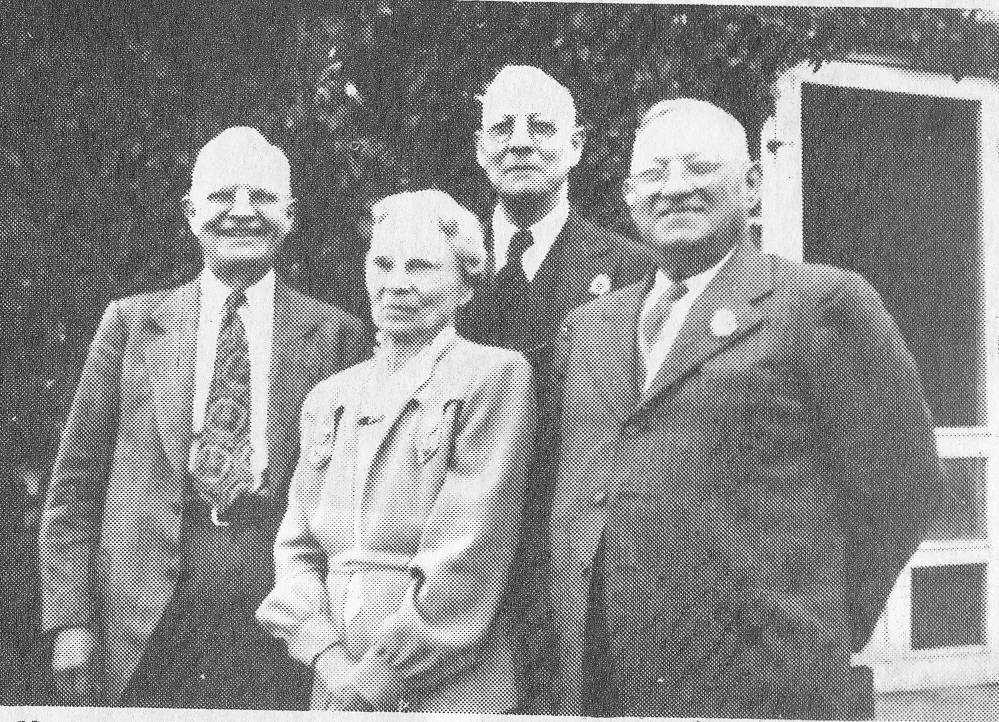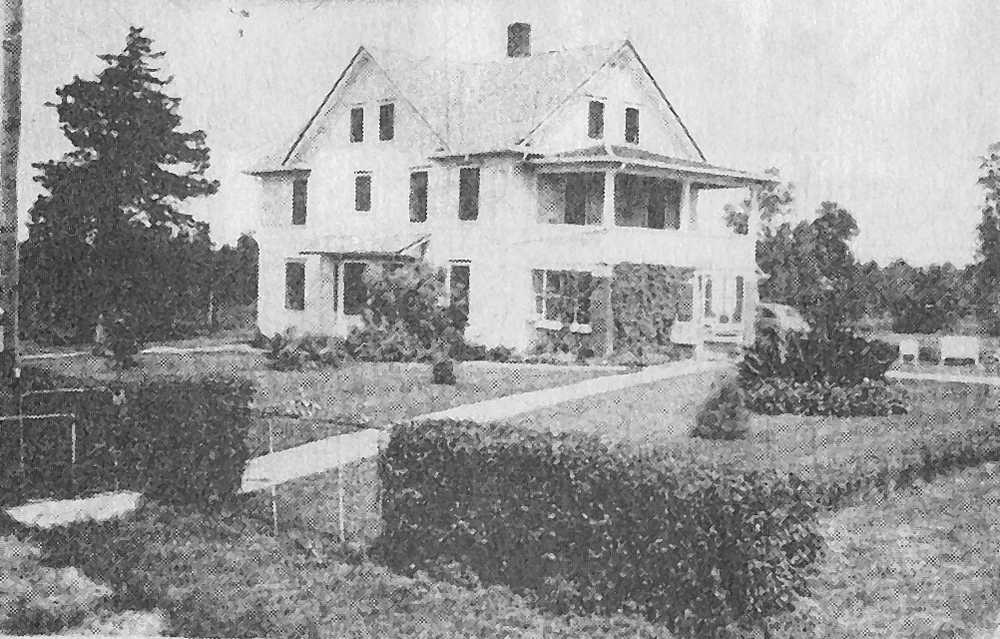Growing old with style and grace
Monday, April 3, 2017

Brothers Irvin, Hugo, Arthur, with sister Verna
My wife, Jean comes from a family life of long livers — especially the generation of her grandparents. They apparently were blessed with good genes, because most of them were not especially fussy about good health habits.
In the early days of our marriage, in the 1950s, I was privileged to get to know these people, on their annual visits to “the farm.”
They were an interesting generation. As a group, they loved life and were moderates in most things, including their own health. There was one outstanding exception to this generalization — Aunt Verna.

The farm home so beloved by the Leisys.
Veronika, the oldest daughter in a family of four boys and another girl, was spoiled as a child, and miraculously kept that status in the family for her whole long life. Vernie, to her siblings, and Aunt Verna to the rest of the family, born in1866,was frankly “a character.” Her immediate family was not wealthy, but her cousin’s family, in Cleveland, had one of the leading breweries in Ohio — and a great deal of money. Verna’s Cleveland cousin liked having Verna, in Nebraska, as a “best friend” and traveling companion — which allowed Verna to travel abroad with the cousin’s family and spend lengthy periods of time with that family in Cleveland, attending the opera and dances and varied social events with the elite families of Cleveland.
Along the way Verna got to develop her considerable talents in the arts — painting and music — which were barely tolerated by the good folks in rural Wisner, Nebraska. No matter, Verna fell in love and married a young Nebraska doctor, and together the two attempted to bring some of the good life and lofty social graces to Northeast Nebraska. This, however, was not meant to be, for Dr. Crosby, Verna’s husband, died at an early age, before the couple had children. Verna never did marry again.
For a few years Verna stayed in Lincoln, where she lived in a small apartment and gave piano lessons, earning a meager living, which her brothers augmented with regular donations, allowing Verna to attend the Lincoln musical events and generally live a comfortable life.
In the late ‘40s, while at the University of Nebraska, Jean and I used to visit Aunt Verna at her apartment in South Lincoln. She was invariably gracious and in a good mood, serving tea and cookies with something of a flourish. Jean was a favorite niece and Aunt Verna encouraged her to keep up her music, and punctuated that encouragement with the promise of the gift of her diamond ring, “if Jean would complete her music degree at the U.”
It was a easy promise for Jean to keep. Jean has enjoyed having the ring for years , and now, that beautiful ring has been duly passed on to one of Jean’s musical daughters.
In Lincoln Verna began to hear about the wonderful things the Kellogg Center, in Battle Creek, Michigan was doing in the field of alternative medicine. The Kellogg Center’s message soon became the all-consuming goal of Verna’s life. Her brothers with their regular contributions, allowed her to move to the Kellogg Center and experience that way of life first hand. At age 88 Verna announced that her fingers were becoming prematurely stiff.
She thought that if she had a new Grand piano she would be better. I didn’t hear the discussion that the brothers had, but the result was that Verna did, indeed get her Grand Piano. I doubt that she ever played any more concerts, but she was mighty happy with her new “Grand” piano.
For a number of years Verna lived at the Kellogg Center. She quickly became an excited spokesman for that institution. In the 40s Verna joined her Cleveland relatives for annual, extended visits, to the family farm, now owned and operated by Jean’s father.
Verna’s brother, Hugo, born in 1869, left the farm out of high school and went to work in the Wisner Bank. By 1914 he had become President of that bank and seemed to be well on his career path. However, in that year, when Otto Leisy, the President of the Cleveland Brewery and his wife both died tragically, leaving small children, Hugo answered the call and moved to Cleveland to raise Otto’s children and assume the Presidency of the brewery, until Otto’s son, Herbert would be old enough to take over the top spot in the brewery.
Hugo immediately moved the brewery into a corporation, which divided the manufacturing arm of the business from their real estate, acquired mostly as “Tied Houses,” throughout the city and across Ohio. He successfully managed the brewery operation through World War I.
In 1920 the brewery business in the US took a drastic turn. With one stroke of the pen, an entire industry was abolished in the US, when Prohibition of Alcoholic Spirits became the law of the land. The Leisy Brewery fared better than most breweries. Hugo turned the brewery facilities into the manufacture of a line of soft drinks — which amounted to but a fraction of the former beer business. But at the same time, Hugo began to develop the real estate arm of the brewery — as The Pontiac Improvement Company. “Tied Houses” turned out to include many of the most desirable business locations in Cleveland and Hugo was able to either sell these locations or develop them for new tenants. This enabled the Leisy Brewery to not only survive Prohibition, but actually grow modestly until 1933, when Prohibition was abolished.
Otto’s son, Herbert assumed the Presidency of the Leisy Brewery in 1933 and began a modernization program, which included installing modern equipment and modern methods, That program saw the company grow throughout the ‘30s and after World War II. Hugo oversaw the operation of the Pontiac Improvement Company until his retirement.
By the 1940s Hugo had begun his annual visits to Nebraska and his family home, the Leisy farm. In those years Uncle Hugo and his wife, Anna, motored to Nebraska in a big Cadillac (driven by long-time chauffer, Charley — with Aunt Verna.
These annual visits to the farm were like rituals. I’m sure that the three of them were fussed over more in Nebraska than they were in Cleveland and Battle Creek. Jean’s folks gave up their bedroom and bath. Meals were lavish (Aunt Anna had her breakfast in bed). Ruth, who ordinarily was like a member of the family, as well as Jean’s mother’s right arm, became a maid for those three weeks, with uniform — as well as principal cook.
Aunt Verna brought her own menu, which Ruth carefully followed. Aunt Verna also brought some of her Battle Creek health practices. For instance, she enjoyed a daily “air bath.” The farm home had a partially enclosed upstairs porch, where Verna let her whole body breathe, while at the same time being hidden from the world. This worked well, until the day she decided to move to the front lawn and lounge on a blanket. This almost caused a shutdown of work among the farm hands, till Jean’s mother got her covered with a blanket and hurried inside.
Aunt Verna frowned on the drinking of “spirits.” This put a damper on “Happy Hour,” which Uncle Hugo very much enjoyed. One time I was assigned to be bartender in the kitchen and made up cocktails to order. Aunt Verna came into the kitchen and asked for a glass of milk, which I got for her. She said, “I usually take a tablespoon of spirits in my milk — to sharpen my appetite.”
I carefully measured out one tablespoon of bourbon in her milk. “Well!” she continued, “I always let it run over a little bit!” Thus, Verna’s cocktail. That night Aunt Verna very noticeably became a more lively contributor to the conversation.
Hugo loved to visit “the farm” — to witness the daily schedule, to ride around the section to see how the crops were growing, and to be a part of the activity of harvest. But he also enjoyed his afternoon nap, which he took in the den — in his three piece business suit, on his back, his hands crossed on his chest — never moving for 30 minutes, when he awoke refreshed.
Everyone enjoyed the meal in the evening. One “dressed” for this formal dinner, with its special food, starched table linen, and “maid service.” Hugo presided, encouraging stories from the past.
Various members of the Leisy clan came on successive nights to pay their respects to Aunt Verna, and Uncle Hugo. These two basked in that limelight and had a wonderful time, well into their 90s.
Under such conditions aging was not such a bad thing. Worked for them.

